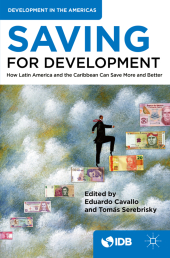 Neuerscheinungen 2016Stand: 2020-02-01 |
Schnellsuche
ISBN/Stichwort/Autor
|
Herderstraße 10
10625 Berlin
Tel.: 030 315 714 16
Fax 030 315 714 14
info@buchspektrum.de |

Eduardo Cavallo, Inter-American Development Ban, Tomás Serebrisky
(Beteiligte)
Saving for Development
How Latin America and the Caribbean Can Save More and Better
Herausgegeben von Cavallo, Eduardo; Serebrisky, Tomás
1st ed. 2016. 2016. xxvi, 329 S. 3 SW-Abb., 91 Farbabb., 129 Farbtabellen. 235 mm
Verlag/Jahr: SPRINGER PALGRAVE MACMILLAN; PALGRAVE MACMILLAN US 2016
ISBN: 1-349-94928-0 (1349949280)
Neue ISBN: 978-1-349-94928-1 (9781349949281)
Preis und Lieferzeit: Bitte klicken
Why should people - and economies - save? This book on the savings problem in Latin America and the Caribbean suggests that, while saving to survive the bad times is important, saving to thrive in the good times is what really counts. People must save to invest in health and education, live productive and fulfilling lives, and make the most of their retirement years. Firms must save to grow their enterprises, employ more workers in better jobs, and produce quality goods. Governments must save to build the infrastructure required by a productive economy, provide quality services to their citizens, and assure their senior citizens a dignified, worry-free retirement. In short, countries must save not for the proverbial rainy day, but for a sunny day - a time when everyone can bask in the benefits of growth, prosperity, and well-being.
This book is open access under a CC BY-NC-ND 3.0 IGO license.
1. Saving for a Sunny Day 2. The State of Saving in Latin America and the Caribbean 3. Financial Systems to Make Savings Count 4. More and Better Saving for Productive Investment 5. Saving for Stability 6. Running Out of Time: The Demographics of Saving 7. Saving for the Future: Pension Systems 8. A Better Way for Government to Save 9. Saving Begins at Home 10. Firm Productivity as an Engine of Saving 11. Breaking the Vicious Circle: Financial Policies for High-Quality Saving
The Inter-American Development Bank (IDB) is an international institution created in 1959 to foster economic and social development in Latin America and the Caribbean.
Eduardo Cavallo is a Lead Economist at the Research Department of the Inter-American Development Bank, USA. Prior to re-joining the IDB, Cavallo was Vice President and Senior Latin American Economist for Goldman Sachs in New York. Eduardo had already worked at the IDB as a Research Economist between 2006 and 2010. Before that, he served as Research Fellow at the Center for International Development, Visiting Scholar at the Federal Reserve Bank of Atlanta, and a member of the faculty at Harvard University´s John F. Kennedy School of Government´s Summer Program. In Argentina, he co-founded Fundación Grupo Innova. Cavallo has published in several academic journals and is co-editor of the IDB book, Dealing with an International Credit Crunch: Policy Responses to Sudden Stops in Latin America. He holds a PhD in Public Policy, an MPP from Harvard University, and a BA in Economics from Universidad de San Andres in Buenos Aires, Argentina.
Tomás Serebrisky is Principal Economic Advisor of the Infrastructure and Environment Department of the Inter-American Development Bank (IDB), USA. Prior to joining the IDB, Serebrisky was Chief Economist of the Antitrust Commission in Argentina, Visiting Professor at Universidad Torcuato Di Tella in Argentina, and Senior Economist in the World Bank, where he led the preparation and supervision of investment projects in several infrastructure sectors. His areas of expertise are the economics of infrastructure investment, public private partnerships, logistics, economic regulation, and antitrust. Serebrisky has published extensively in refereed journals and is the author of Airport Economics in Latin America: Benchmarking, Regulation and Pricing. Serebrisky holds a PhD in Economics from the University of Chicago, USA, and a BA in Economics from Universidad de San Andres in Buenos Aires, Argentina.


